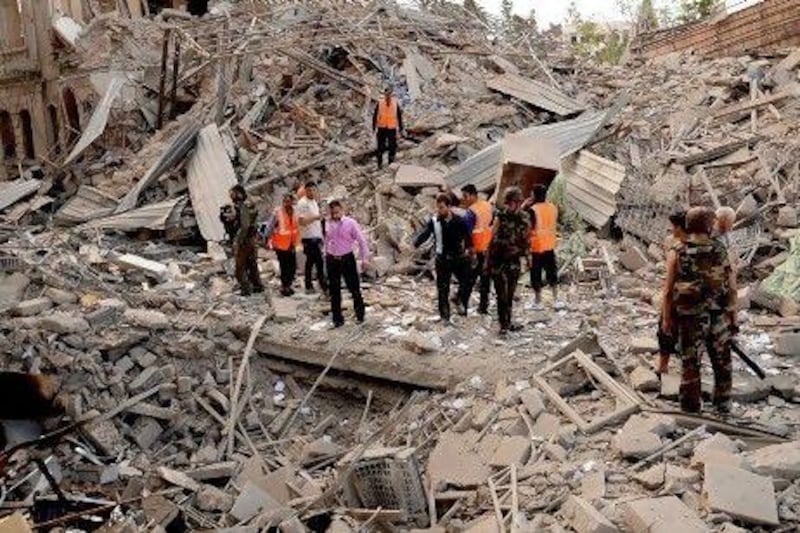Istanbul // Turkey launched artillery strikes on targets in Syria last night in retaliation for the death of a mother and four children in a Syrian mortar attack on a Turkish border town.
"Retaliation was given right away, according to the rules of engagement, by our armed forces on the border," a Turkish government spokesman said. "Targets in Syria that were identified by radar were hit by artillery."
The first cross-border shelling since the conflict in Syria began 18 months ago killed the woman and four children in the town of Akcakale, 200 metres from the border.
Asked whether Turkish authorities were certain the three mortar rounds had been a targeted shelling by Syrian forces, a Turkish diplomat answered: "Yes."
Turkey's foreign minister, Ahmet Davutoglu, briefed the United Nations secretary general Ban Ki-moon and the Nato secretary general Anders Fogh Rasmussen on the incident.
A Nato spokesman said they were watching the development "closely and with great concern". Turkey's deputy prime minister, Besir Atalay, said the Syrian mortar attack was "very serious" and "goes too far".
"People here are anxious, because we got hit before," said Ahmet Emin Meshurgul, local head of the Turkish Red Crescent.
"Security forces tried to convince people to leave the neighbourhood near the border, but now we've been hit right in the middle of the town."
The cross-border military action followed three suicide bombings in the battleground city of Aleppo yesterday. The bombers detonated cars packed with explosives in a regime-controlled area of the city.
At least 34 people died and more than 120 were injured, buildings were destroyed and survivors were trapped under rubble, Syrian state television said.
A fourth bomb exploded a few hundred metres away near the edge of the Old City, a Unesco World Heritage site that has been heavily damaged during more than two months of fierce fighting between rebels and regime forces for control of Aleppo.
There was no immediate claim of responsibility, but the government blamed "terrorists", which is how it describes rebels fighting to topple the regime of Bashar Al Assad. The technique is a signature style of jihadist groups who have entered Syria's civil war.
State television broadcast images of buildings with the facades blown off and twisted debris scattered on the roads, where the blasts left at least one gaping crater. At least one building appeared to have been completely destroyed.
"It was like a series of earthquakes," a resident said. "It was terrifying, terrifying."
There was also video footage of the bloodied bodies of three men in army uniforms, one of whom appeared to be holding a trigger device. A Syrian government official said regime soldiers killed two men before they were able to detonate more suicide bombs.
"The area is heavily fortified by security and the presence of shabiha [pro-regime militias]," said Mohammad Saeed, an opposition activist in Aleppo. "It makes you wonder how car bombs could reach there."
Last week, Syrian opposition fighters announced a new offensive in Aleppo, Syria's largest city, control of which is now divided between forces loyal to the regime and opposition rebels.
As Syrian troops continue to battle to retake control of Aleppo, more soldiers are reportedly being deployed to the city. On Tuesday, a pro-Syrian government newspaper in Lebanon reported that Mr Al Assad was visiting Aleppo for a first-hand look at the fighting and had ordered 30,000 more troops into the battle.
The exact number of dead from yesterday's bombings could not be confirmed, with reports ranging from the state media's toll of 33 to 48 people dead, according to the UK-based Syrian Observatory for Human Rights, which relies on a network of activists on the ground.
"We condemn these crimes and this terrorist explosion and we also condemn the countries that conspire against Syria and stand behind the terrorists," Mohammad Jihad Al Lahham, the speaker of the Syria's parliament said yesterday.
Meanwhile, across the border in Lebanon, explosions were reported yesterday in the country's eastern Bekaa region, a Hizbollah stronghold.
Lebanon's state news agency referred to a Hizbollah statement, saying that three members of the Lebanese Shiite movement had been killed and a number wounded after the explosion at a munitions depot in the area of Nabi Sheet. There was no indication what triggered the blast
More questions are being raised about Hizbollah's involvement in the war across the border, following reports of the deaths inside Syria of fighters from the Lebanese Shiite movement.
On Tuesday, Hizbollah-affiliated media reported funerals for two men - including a senior commander identified as Ali Hussein Nassif - were held in the Bekaa region. The reports said the men were killed performing "jihadi duties", but did not elaborate.
A Lebanese security official said Nassif was killed in Syria and his body returned to Lebanon last Sunday. He said the bodies of several other Hizbollah fighters had recently arrived back in Lebanon.
There have been conflicting reports about how Nassif died, with some claiming he was among several Hizbollah fighters killed in an attack close to the Lebanese border.
Hizbollah has remained supportive of the Assad regime throughout the 18-month Syrian crisis, but has not confirmed armed involvement in the conflict. Syrian opposition members and rebels have maintained that Hizbollah fighters are involved in the conflict inside Syria.
Meanwhile, dozens of armed men gathered yesterday on the Syrian side of the frontier of the Israeli-occupied Golan Heights. An Israeli military spokesman said it was unclear what the Syrians were doing in the area, but there were no reports of violence.
Israel has expressed concern about the possibility of the violence in Syria spilling across into Israeli-controlled areas.
* With additional reporting by Zoi Constantine in Beirut, Reuters, the Associated Press and Agence France-Presse





